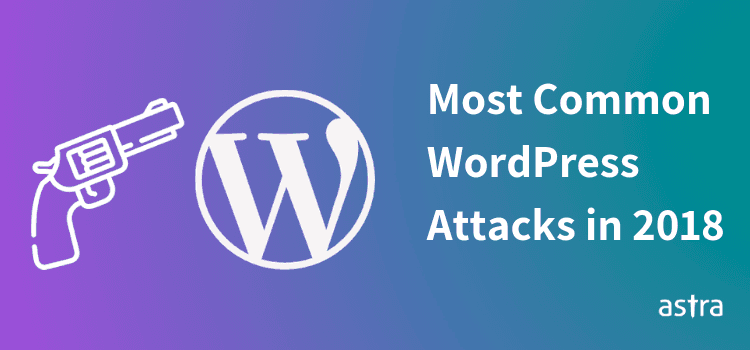WordPress has held the title of the biggest content management system for well over a decade.
It has ushered in a new generation of websites — built by individuals who had nothing more than a raw idea in their head.
One of the key features that made WordPress so popular is its unparalleled scalability. With thousands of third-party developers of themes and plugins, it’s easy to whip up a unique, professional-looking website without writing a single line of code.
The bad news is, this popularity didn’t come without a price.
Just like the Windows operating system, hackers favored targeting WordPress due to its massive user base.
During one of the platform’s worst security breaches, over 18 million WordPress users were reportedly affected. Data also shows that up to 73.2 percent of well-known WordPress-powered websites have vulnerabilities.
If those figures are not disconcerting, I don’t know what is.
Fortunately, all online threats that can affect your WordPress website can be effectively prevented. But first, we need to arm you with adequate knowledge of these threats so you can have a better grasp of the solutions.
Without further ado, here are the most common WordPress attacks you ought to be aware of.
1. Plugin Vulnerabilities
If you’re like most WordPress users, plugins probably played a huge role in the website development process.
After all, WordPress is designed with developers and non-developers in mind. It can be used by any aspiring blogger, e-commerce entrepreneur, or freelancer who needs an online presence established as fast as possible.
You can always rely on plugins to fill the knowledge gaps and integrate all sorts of functionality into your website. Unfortunately, plugins represent the majority of all attack entry points in a WordPress ecosystem.
Statistics reveal that anywhere between 54 percent and 55.9 percent of all WordPress attacks can be caused by plugins.
The developer of the plugin, per se, aren’t always directly responsible for these attacks. Sometimes, hackers only manage to find vulnerabilities within the plugin’s code and use them to access sensitive website data.
To make sure you’re protected against plugin vulnerabilities, here some ground rules to remember:
Update Your Plugins
A reliable way to prevent plugin-based attacks is to make sure you keep them updated. This enables the plugins to patch any known vulnerabilities in the previous version.
From the WordPress dashboard, go to “Installed Plugins” from the “Plugins” section to check for the latest updates.

A simple trick is to click the checkbox to the left of the “Plugin” column header to select all plugins. From there, select “Update” in the “Bulk Actions” drop-down menu and click “Apply” to perform the updates.

Use Plugin Security Scanner
If an outdated plugin isn’t the problem, you can use the Plugin Security Scanner to automatically detect existing security issues with your plugins.
Upon installation, you can access the plugin under the “Tools” section of your WordPress dashboard.

Plugin Security Scanner will then proceed to scan your plugin library for any known vulnerabilities. You can also configure real-time email alerts that trigger whenever the tool detects new vulnerable plugins in your WordPress CMS.

Avoid Abandoned Plugins
Lastly, you need to avoid plugins that are clearly already abandoned by their developers.
These plugins shouldn’t be hard to spot on the WordPress official plugin repository. If a plugin hasn’t received any updates in the last 12 months, chances are its developer no longer supports it — making it vulnerable to exploits that hackers may have found.

2. Brute Force Attacks
Next, to compromised plugins, the lack of login security is also among the most common ways hackers target WordPress websites.
In the practice known as a brute force attacks, hackers leverage software that generates hundreds if not thousands of password guesses to force their way into your system.
These attacks are particularly troublesome for users who have poor credential management habits, namely the use of “admin” as their account username as well as unsafe passwords like “12345,” “letmein,” and “password.”
To prevent brute force attacks, using more secure usernames and passwords is a step in the right direction.
You can also use two-factor authentication to make your WordPress account virtually impervious to these hacks. This typically involves one-time passcodes — sent by email or SMS — as an extra authentication step before a login can be permitted.
There are a handful of two-factor authentication plugins that will help you take advantage of this feature:

3. WordPress Core Vulnerabilities
At this point, we’ve already made it clear that WordPress isn’t exactly the most secure CMS on the planet.
It often doesn’t take long before new vulnerabilities within WordPress are discovered. In some cases, even vulnerabilities like the unserialization issue go unpatched for over a year — making thousands of WordPress users at risk of data breaches.
Luckily, the WordPress team regularly releases updates to the core CMS to address most security issues. That said, you should make it a habit to update WordPress to the latest version whenever possible.
As of December 2018, the CMS recently launched WordPress 5.0, which includes a number of security updates and features to enrich the experience. Further security patches also require the latest version of WordPress, so there should be no reason for you to forego updates unless you’re waiting for reviews to ensure the stability of the new platform.
You can easily apply the latest WordPress updates from the “Updates” page under the “Dashboard” menu.

4. Malware & DDoS Attacks
Regardless if you use WordPress or not, malware and DDoS or Distributed Denial of Service attacks are a threat to your website.
In simple terms, a DDoS attack works by flooding a website’s server with fake traffic.
The disruption in service is generated with a network of computers infected by malware, also known as a botnet.
While DDoS attacks and malware aren’t always used in pairs during a breach, defending against them can be done through a single cybersecurity solution.
Of course, you’re welcome to test any of the free cybersecurity plugins available at the official WordPress repository. But if you’re already a large company with truckloads of data to protect, you should seriously consider paying for enterprise-grade solutions like Astra.
Aside from remote malware scanning and DDoS protection, Astra also utilizes threat analytics to maximize your defense against file injections, spam, potential brute force attacks, zero-day attack. It can also actively scan your WordPress website for backdoors and other known vulnerabilities so you can clean your CMS before symptoms even appear.

Conclusion
Keeping your WordPress website secure isn’t a walk in the park, but it’s not rocket science, either. It all starts with a deeper understanding of how certain attacks work and what you can do to avert them.
The post above should be more than enough to prepare your WordPress website for another productive year. If you liked what you read, check out this post on the top information security risks to be aware of in 2019.
Our security solution Astra makes your website remains secured from all cyber attack in real time without any ifs & buts. The Astra dashboard maintains a log of every attack on your website with details like most attacked areas, origin, type of attack, parameter, IP, login details & alerts etc.
Take an Astra Demo now.
Remember, when it comes to cybersecurity, information is paramount. Good luck!
















